Your guide to management careers in Australia

Most managers across Australia have recently had to do something that they were never trained for – managing remotely. The great leveller that is the COVID-19 pandemic forced managers to quickly adapt their face-to-face skills to an online environment.
They can now take this experience into any future role, just like their previous management skills.
Management is a transferable skill set that can be applied in any industry. In fact, management job titles such as chief executive, human resources manager, information technology manager and operations manager can be found in almost all large organisations.
Of course, management jobs also require an understanding of the industry they’re in. But with the right business management degree you can choose from a wide variety of management positions.
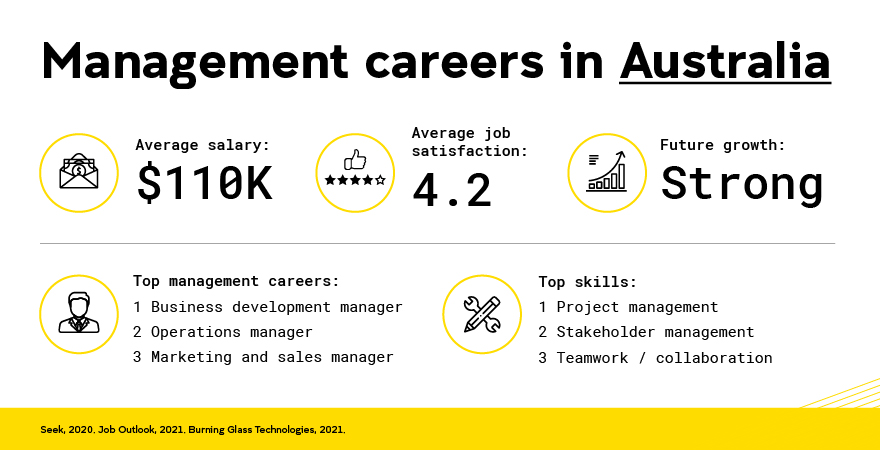
What is a management role?
According to LinkedIn, the role of the manager is opposite to that of the employee. When you were an employee, your priority was getting things done – as a manager your role is to inspire your employees to hit their goals. It’s less about you, and more about them.
To be more specific, Forbes breaks down the role into managing and leading. Managing is the business administration side of things – to direct or carry on business. Leading is more about human relationships – directing operations, activity or performance.
Research by the Australian Centre for Business Growth has found that a common reason for business failures in Australia is a lack of management and leadership skills.
Contemporary leaders can give themselves the best chance of success in management jobs with UNSW’s 100% online Master of Management.
Let’s take a look at some popular job titles for managers where you can put this master’s degree to work.
Chief executive
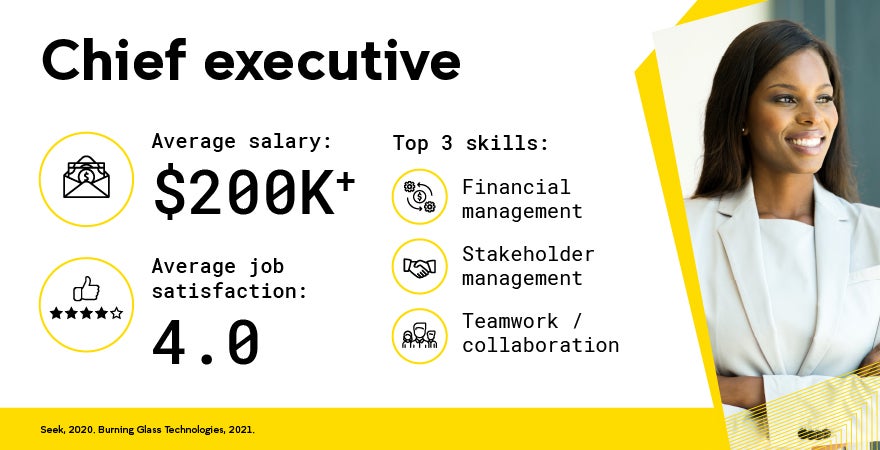
No matter how flat the organisational chart may be, there’s always one management position at the top for the chief executive officer (CEO). However, even though this is the highest-ranking executive in a company, the CEO is still answerable to a board or the business owner.
In addition to effectively and efficiently managing the operations and resources, the CEO is responsible for the overall business strategy.
Job satisfaction for chief executive officers sits around four stars out of five. Variety of work rates a little higher, while job security and career progression opportunities rate a little lower. After all, where do you go once you’ve reached the top?
The most common salary for chief executive officers is above AU$300,000.
General manager
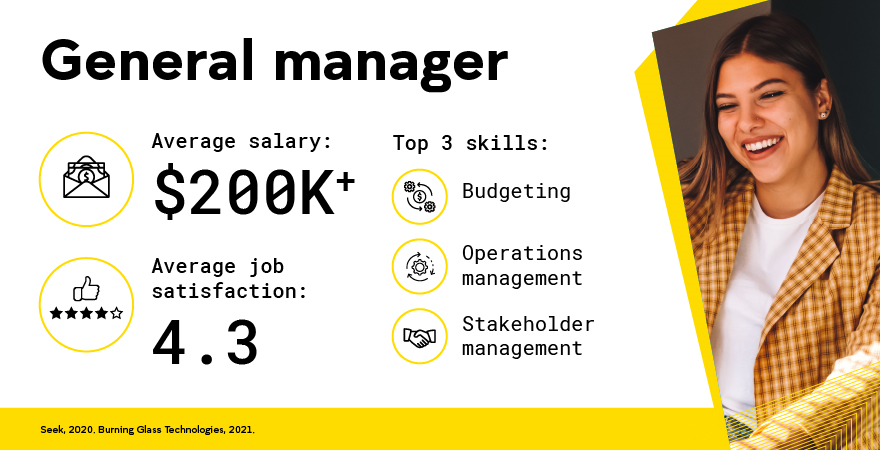
While the CEO is responsible for the overall business strategy, it’s usually general managers who are tasked with converting that strategy into tangible actions. Depending on the size of the organisation, there may be one or several general managers heading up different areas of the business.
You’ll need to have extensive industry experience to plan, organise, direct, control and review daily operations – and keep a close eye on profitability.
Job satisfaction for general managers is a solid four and a half stars out of five. Just like CEOs, variety of work rates a little higher, while the drawbacks are job security and work-life balance.
The most common salary for general managers is above AU$200,000.
Operations manager
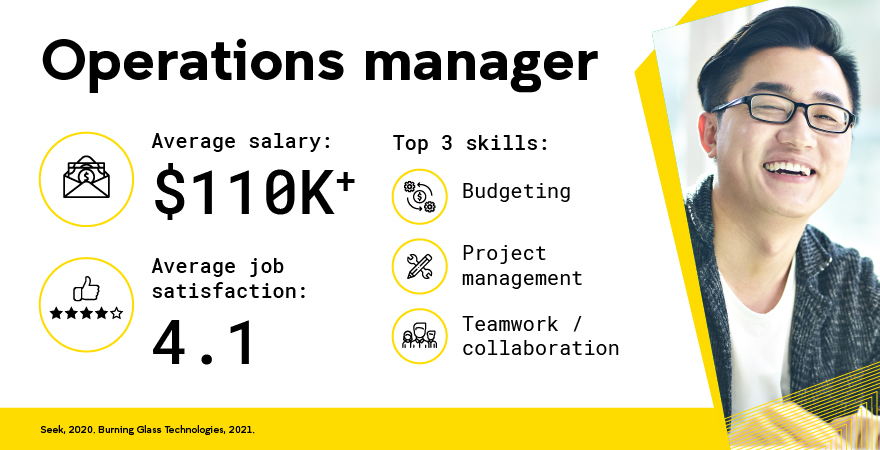
In some large organisations, many employees are unlikely to ever find themselves in the same room as the CEO or the general manager. In contrast, they’ll know very clearly who the operations manager is and what they expect.
As the name implies, the operations manager runs day-to-day operations such as the production or distribution of products, or the delivery of services.
Job satisfaction for operations managers is just over four stars out of five. Just like general managers, the variety of work increases job satisfaction, while work-life balance drags it back down.
The most common salary for operations managers is AU$110,000.
Project manager

When you’ve got a project that has to be completed on time and on budget, who are you going to call? The project manager – for successful project management from ideation to completion.
This is a specialist role that may be a contract for a one-off project, or an ongoing role applied to different projects within an organisation. The project manager hires and manages project teams, supervises project documentation and delivers reports to stakeholders.
Job satisfaction for project managers is a decent four and a half stars out of five. The only shortfall on the job satisfaction survey was job security, which may be down to the project specific nature of this role.
The most common salary for project managers is AU$130,000.
Marketing manager

The role of the Marketing Manager has experienced a high level of digital disruption over the last two decades. Marketing campaigns that were once conducted via print, radio and TV are now carried out through Pay Per Click, Search Engine Optimisation (SEO) and Social Media.
Marketing managers plan, organise and coordinate marketing campaigns that support the business objectives of the general manager and business strategy of the CEO. This role involves a high level of data analysis to measure the performance of marketing campaigns.
Job satisfaction for marketing managers is slightly above four stars out of five. Variety of work rates higher, while job security and salary rate a bit lower.
The most common salary for marketing managers is AU$110,000.
Sales manager

The job titles of sales manager and marketing manager are often conflated into one role, but these are two very distinctive management careers. Where marketing managers are focused on consumer data, sales managers are fixated on client relationships.
A sales manager is often the team leader of a group of sales representatives. They use soft skills in coaching and mentoring in training programs to improve their team’s performance.
Sales managers also have exceptional communication skills for sales presentations, trade shows and product demonstrations.
Job satisfaction for sales managers is a bit more than four out of five stars. Sales managers are happy with their variety of work and work-life balance, but not so happy with their pay and career progression opportunities.
The most common salary for sales managers is AU$110,000.
Information Technology (IT) manager
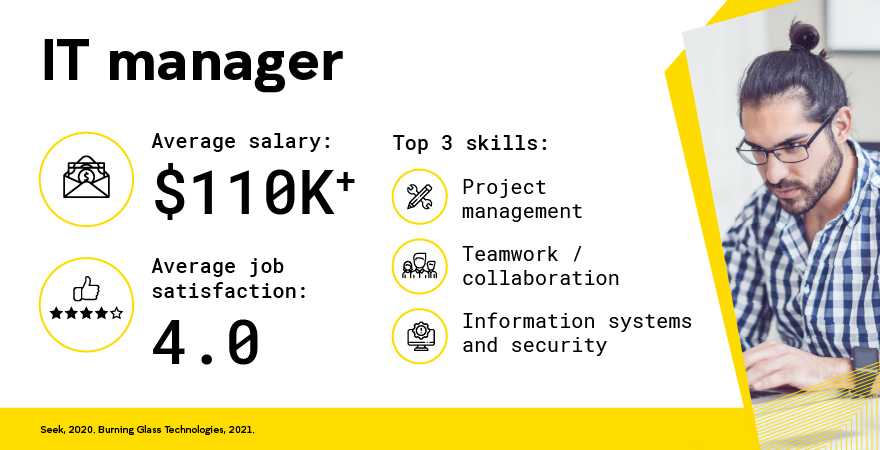
It’s a bit of an oversimplification to say that the IT manager oversees an organisation’s computer systems, networks and software.
In a digital world that increasingly relies on cloud computing and software as a service (SaaS), IT managers are often the conduit between their organisation and external suppliers.
IT managers also have a highly developed soft skill set. This includes leadership for managing teams and communication/negotiation skills to ensure other business units have the IT resources they need.
Job satisfaction for IT managers is currently at version 4.0 – or four out of five stars. The survey categories of job satisfaction and variety of work get the full four stars, while work-life balance is responsible for a slight lag in this rating.
The most common salary for IT managers is AU$110,000.
Human Resources (HR) manager
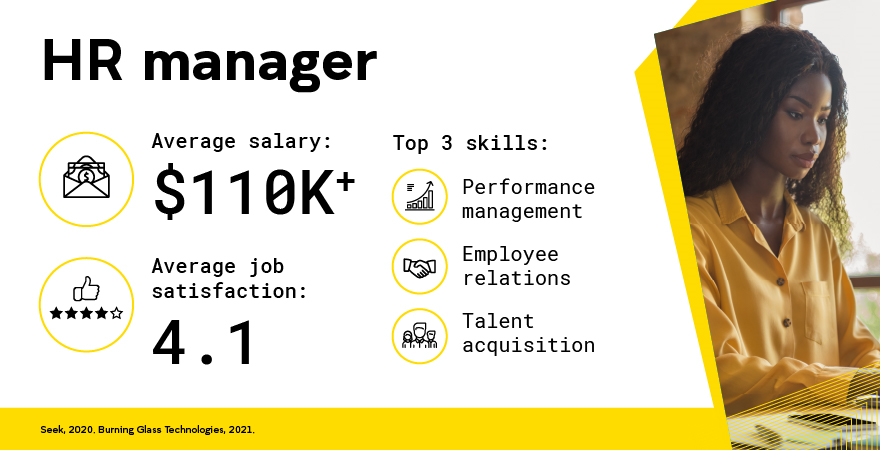
Human resource management is about maintaining a team of suitable employees that can effectively and efficiently achieve business goals.
As an HR manager you might specialise in occupational health and safety, training and development, or workplace relations. In some organisations you may be responsible for all three.
This is a role that calls on excellent communication skills, particularly when it comes to listening. In addition to advising other managers on recruitment practices, you may represent the business in negotiations with unions, or address workplace complaints.
Job satisfaction for HR managers is only just peaking over four out of five stars. They are very satisfied with the variety of work – less so with salary and career progression opportunities.
The most common salary for HR managers is AU$110,000.
Management consultant
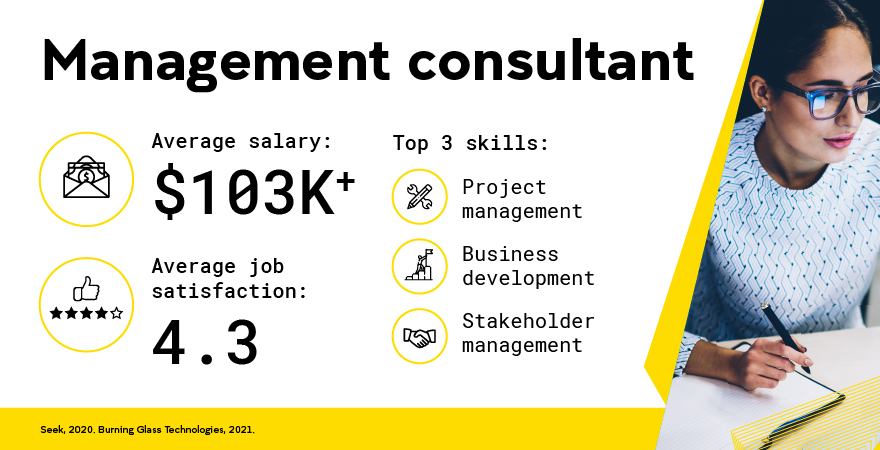
Management consultants are brought into businesses to identify and solve organisational problems to achieve greater efficiency.
While a management consultant may be a sole proprietorship, they may work for a consulting firm like PwC or work internally at large organisations or government agencies.
Job satisfaction for management consultants is approaching four and a half stars out of five. This relatively high rating is led by the variety of work but let down by job security.
The most common salary for management consultants is AU$103,000.
The master of management
While some of the management careers on this list may share some common characteristics, there’s one thing that connects all of them – the Master of Management at UNSW Online.
Designed for recent graduates and professionals seeking career development, the Master of Management can be completed in as little as two years with part-time study that’s 100 per cent online. Completion time dependent on individual study path, RPL, leave and course availability. Please speak to a Student Advisor for more information.
In addition to developing your leadership, management and other soft skills, you’ll focus on strategies for disruption, managing with digital technology and business analytics.
This master’s degree trumps other business schools by delivering relevant, practical and contemporary business management skills.
In Australia, UNSW is ranked second for Business and Management Studies and top three for graduate employability.
With a Master of Management from UNSW Online, you’ll not only have a competitive edge in your management career path, but you’ll also take the next pandemic or any other global challenge in your stride.
Learn how you can become a contemporary leader with a Master of Management at UNSW Online today.








